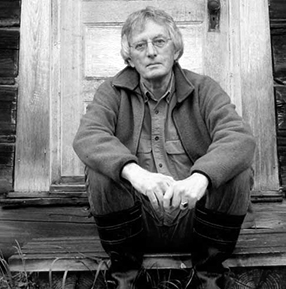for Coleman Hawkins
The structure of landscape is infinitesimal,
Like the structure of music,
seamless, invisible.
Even the rain has larger sutures.
What holds the landscape together, and what holds music together,
Is faith, it appears—faith of the eye, faith of the ear.
Nothing like that in language,
However, clouds chugging from west to east like blossoms
Blown by the wind.
April, and anything’s possible.
Here is the story of Hsuan Tsang.
A Buddhist monk, he went from Xian to southern India
And back—on horseback, on camel-back, on elephant-back, and on
foot.
Ten thousand miles it took him, from 629 to 645,
Mountains and deserts,
In search of the Truth,
the heart of the heart of Reality,
The Law that would help him escape it,
And all its attendant and inescapable suffering.
And he found it.
These days, I look at things, not through them,
And sit down low, as far away from the sky as I can get.
The reef of the weeping cherry flourishes coral,
The neighbor’s back porch light bulbs glow like anemones.
Squid-eyed Venus floats forth overhead.
This is the half hour, half-light, half-dark,
when everything starts to shine out,
And aphorisms skulk in the trees,
Their wings folded, their heads bowed.
Every true poem is a spark,
and aspires to the condition of the original fire
Arising out of the emptiness.
It is that same emptiness it wants to reignite.
It is that same engendering it wants to be re-engendered by.
Shooting stars.
April’s identical,
celestial, wordless, burning down.
Its light is the light we commune by.
Its destination’s our own, its hope is the hope we live with.
Wang Wei, on the other hand,
Before he was 30 years old bought his famous estate on the Wang River
Just east of the east end of the Southern Mountains,
and lived there,
Off and on, for the rest of his life.
He never travelled the landscape, but stayed inside it,
A part of nature himself, he thought.
And who would say no
To someone so bound up in solitude,
in failure, he thought, and suffering.
Afternoon sky the color of Cream of Wheat, a small
Dollop of butter hazily at the western edge.
Getting too old and lazy to write poems,
I watch the snowfall
From the apple trees.
Landscape, as Wang Wei says, softens the sharp edges of isolation.
Credit
Excerpted from A Short History of the Shadow by Charles Wright. Copyright © 2002 by Charles Wright. Reprinted by permission of Farrar, Straus, and Giroux. All rights reserved.
Date Published
01/01/2002

